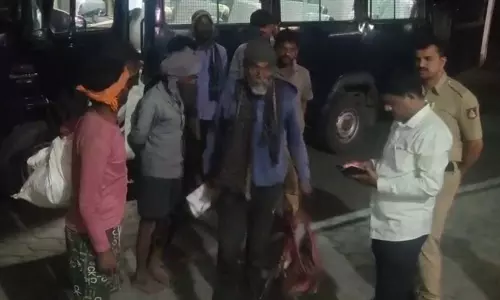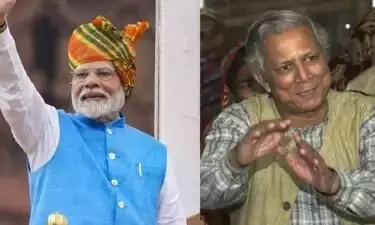
Yunus replies ‘Exaggerated’ to PM Modi’s concerns on increased attacks on Hindus
text_fieldsIn the first conversation with Prime Minister Narendra Modi, after an interim government took charge in Bangladesh following Sheikh Hasina’s ousting, Muhammad Yunus assured the safety of all citizens in response to PM Modi’s urging for the protection of the Hindus and other minorities while stating 'exaggerated' for the concerns of increased attacks on Hindus.
This interaction marked the first high-level engagement between India and Bangladesh since Yunus took office as the chief adviser of the interim government in Dhaka on August 8. His appointment followed a four-day political vacuum after the ousting of Sheikh Hasina, who had been in power for 15 years. Yunus, a Nobel laureate, assumed leadership amidst a backdrop of political turmoil, including a massive student-led uprising that had culminated in Hasina fleeing to India.
In their discussion, Modi reiterated India's commitment to ongoing development projects in Bangladesh and expressed support for a democratic, stable, and peaceful Bangladesh. Yunus, on his part, assured that the interim government would prioritise the protection and security of all minority groups, stressing that the situation in the country was stabilising. He also invited Indian journalists to report on the ground to verify the actual situation regarding minority protection in Bangladesh.
The conversation also touched upon broader bilateral relations, with India extending an invitation to Yunus to participate in the upcoming third edition of the Voice of the Global South summit, which he accepted. Both sides expressed optimism about continued cooperation, although they did not disclose whether Hasina's presence in India was discussed.
The Ministry of External Affairs (MEA) in India released a statement summarising the conversation, highlighting Modi’s concerns about the safety of minority communities in Bangladesh and Yunus’s assurances. Meanwhile, the Bangladeshi side focused on Yunus’s commitment to restoring normalcy in the country and fulfilling the democratic aspirations of its citizens.
Sheikh Hasina, who fled to India with her sister amid the political upheaval, remains in exile. Her departure was prompted by a popular uprising that began as a student protest against government job quotas and escalated into widespread unrest. The situation in Bangladesh became increasingly volatile, with reports indicating that between 300 and 400 people were killed by security forces during the protests. These events occurred while the country’s internet and mobile networks were largely shut down.
Hasina’s continued stay in India has raised diplomatic concerns, particularly after her recent statement from exile, calling for an investigation into the deaths during the uprising and condemning what she described as “terrorist aggression.” Bangladesh’s foreign affairs adviser conveyed to the Indian high commissioner that Hasina’s statements from India were not conducive to fostering better bilateral relations.























